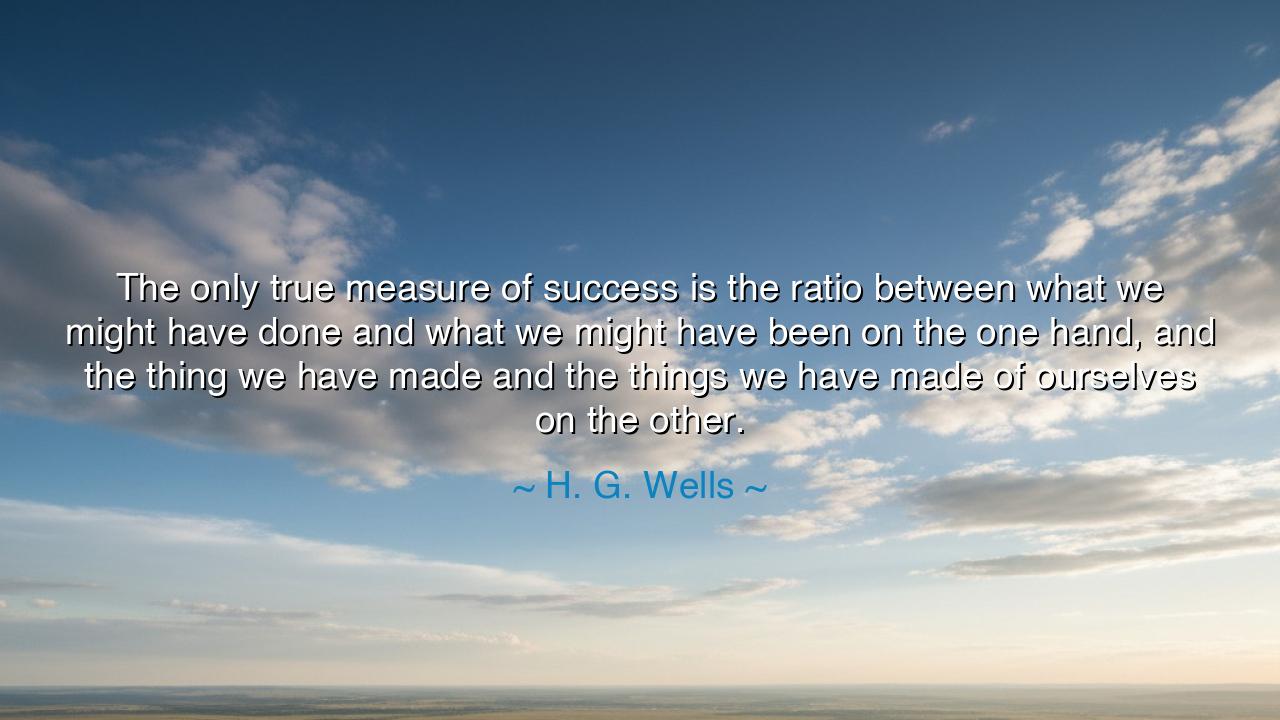
The only true measure of success is the ratio between what we
The only true measure of success is the ratio between what we might have done and what we might have been on the one hand, and the thing we have made and the things we have made of ourselves on the other.






“The only true measure of success is the ratio between what we might have done and what we might have been on the one hand, and the thing we have made and the things we have made of ourselves on the other.” Thus spoke H. G. Wells, the great seer of modern times, whose mind envisioned futures both wondrous and terrible. His words pierce deeper than gold, titles, or fame. He reminds us that success is not what the world praises in fleeting applause, but the comparison between our potential and our reality. To be given gifts and to squander them is failure, though the world may call it triumph. To be given little and to forge greatness from it is success, though the world may call it small.
The ancients knew this truth and spoke of it in their own way. They said a man is judged not by what fortune bestows, but by what he makes of the fortune given. One youth may inherit a kingdom and lose it in folly; another may inherit nothing but a staff and sandals, yet through wisdom build a city that endures. Wells’ measure of success is not outward comparison to others, but inward comparison to the self—the possible self, the might-have-been, weighed against the reality we carve with our hands and our will.
Consider the life of Leonardo da Vinci. The world saw in him not only an artist but an inventor, a dreamer, a seeker of the eternal laws of nature. Yet even Leonardo confessed that he left much undone, that the gap between his visions and his completed works was wide. According to Wells’ wisdom, Leonardo’s success is not merely in the Mona Lisa or The Last Supper, but in how much of his vast potential he transformed into reality. His greatness lies in having stretched human possibility far beyond what was thought attainable.
History too offers us the humbler example of Abraham Lincoln. Born in poverty, raised in obscurity, given little by birth, he might have remained a nameless farmer. Yet through perseverance, integrity, and a ceaseless hunger to learn, he rose to guide a nation through its darkest hour. If success is the ratio of potential to fulfillment, Lincoln stands as a giant—not because he achieved all that could be imagined, but because he transcended the narrow limits that birth and station had given him. He became far more than he “might have been,” and so his life remains a beacon.
The lesson is clear: do not measure yourself by another’s path, for you do not know their gifts or their burdens. Instead, measure yourself by the gap between your possibility and your reality. Ask: Have I used what is within me? Have I cultivated my talents, strengthened my character, pursued my calling with faith? If so, you are successful, even if no crown sits upon your head. If not, then even with treasures and titles, your soul remains impoverished.
O seekers of wisdom, let this truth weigh upon your hearts. Each of you has been entrusted with talents, opportunities, and time. These are seeds. The question is not how many you were given, but what you have planted, what fruit you have borne. To waste them is to betray yourself; to use them fully is to honor both yourself and the Giver of life. In the end, your greatest rival is not your neighbor but the shadow of what you might have been.
In practice, this means cultivating awareness of your own gifts and working daily to refine them. Reflect not on what others achieve, but on whether you have drawn closer to your best self today. Strive to close the distance between your potential and your reality. Seek growth, not applause; depth, not glitter. For when the final account is taken, the truest measure of success will not be wealth, nor fame, nor praise, but how faithfully you have become all that you were meant to be.
Thus the words of H. G. Wells endure as a lamp for all who journey: success is the balance between the possible self and the realized self. Walk with this in your heart, and you will find meaning beyond vanity, greatness beyond applause, and a legacy that shines brighter than gold.






AAdministratorAdministrator
Welcome, honored guests. Please leave a comment, we will respond soon